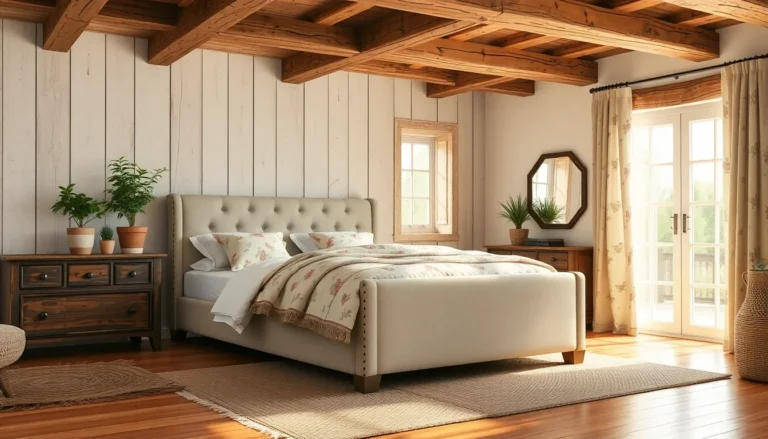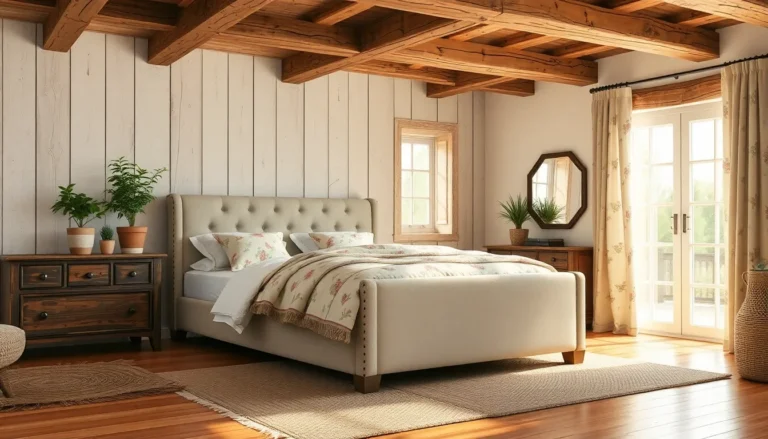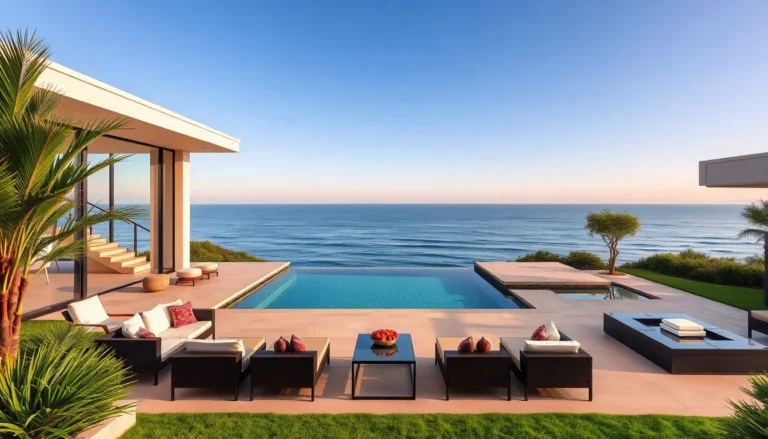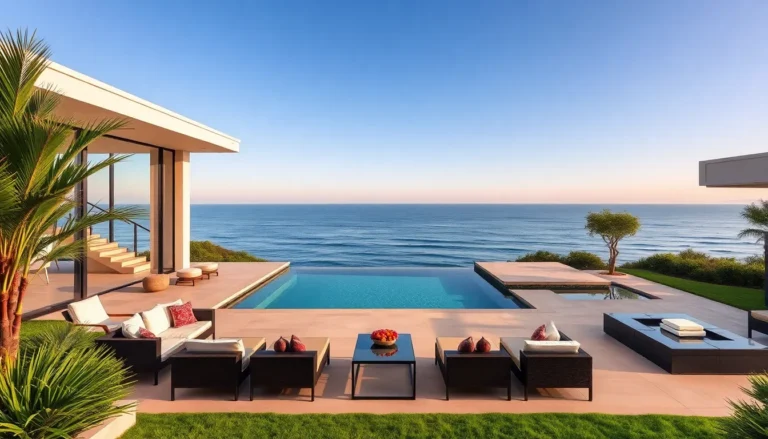Table of Contents
ToggleLuxury real estate isn’t just about opulence; it’s a playground for the discerning buyer who wants more than just a roof over their head. As the market evolves, so do the tastes and preferences of high-end homebuyers. From eco-friendly mansions to smart homes that practically run themselves, the trends in luxury real estate are as dynamic as they are enticing.
Overview of Luxury Real Estate Trends
The landscape of luxury real estate is shifting significantly. This sector is increasingly focusing on sustainability and technology. Eco-friendly homes appeal to buyers who prioritize carbon footprints and green living. High-end properties now often feature solar panels, energy-efficient appliances, and sustainable building materials.
Smart home technology enhances the allure of luxury listings. Many buyers appreciate homes equipped with advanced automation systems for lighting, security, and climate control. Convenience often intersects with luxury, making homes not just indulgent but also functional.
Another trend involves the integration of wellness features. Buyers seek properties that promote healthy living, such as fitness areas, yoga studios, and serene outdoor spaces. Water features and natural landscaping are gaining popularity as they enhance tranquility and escapism.
Investors and buyers also gravitate towards urban and suburban locations that blend luxury with accessibility. Close proximity to upscale shopping, fine dining, and cultural hotspots is now a must-have. Neighborhoods that offer vibrant community amenities tend to attract discerning buyers looking for a lifestyle rather than just a property.
Luxury real estate is also seeing a rise in interest for legacy homes. These dwellings boast historical significance and unique architectural styles. Properties that tell a story can captivate buyers who appreciate heritage alongside modern luxuries.
Market data indicates these trends are likely to continue. Increased awareness surrounding climate change and the importance of wellness will shape future demands in luxury home design. Agents must stay informed to cater to these evolving preferences and provide tailored experiences that meet modern expectations.
Current Market Analysis

The luxury real estate market continues to evolve, influenced by various key factors and technological advancements.
Key Factors Driving Demand
Sustainability shapes luxury homebuyer preferences significantly. Buyers increasingly prefer eco-friendly features like solar panels and energy-efficient appliances. Wellness spaces also attract interest, leading to properties with fitness areas and serene outdoor settings. Neighborhood desirability matters, as potential buyers seek urban and suburban locations with accessibility to shopping, dining, and cultural amenities. Furthermore, historical significance cannot be overlooked; legacy homes with unique architectural styles capture attention, appealing to buyers who cherish heritage in their luxury investments.
Role of Technology in Luxury Real Estate
Smart home technology enhances the allure of luxury properties. Automation for lighting, security, and climate control improves convenience and energy efficiency. Buyers show a preference for homes equipped with the latest tech innovations, reflecting a growing trend in modern living. Virtual tours and augmented reality listings also elevate the home-buying experience, enabling potential buyers to explore properties remotely. Moreover, data analytics aids real estate agents in understanding market trends and buyer preferences, ensuring tailored experiences that align with today’s demands.
Design Trends in Luxury Properties
Design trends in luxury properties reflect the desires of modern buyers, emphasizing sustainability and technological advancements. Buyers increasingly prioritize homes that align with environmental values and sophisticated living.
Sustainable Architecture
Sustainable architecture has become a cornerstone of luxury real estate. Homebuyers now favor designs that minimize environmental impact while maximizing aesthetics. Incorporating renewable materials, energy-efficient insulation, and green roofs characterizes many new constructions. Properties featuring solar panels and rainwater harvesting systems appeal to buyers committed to eco-friendliness. Furthermore, natural light plays an essential role, with large windows and open spaces enhancing well-being and comfort. Architects and designers focus on creating homes that blend seamlessly with their surroundings, fostering harmony with nature.
Smart Home Features
Smart home features are revolutionizing luxury living experiences. Automation technologies provide homeowners with control over lighting, climate, and security systems from anywhere. Integrating voice-activated assistants and smart appliances increases convenience and efficiency. Additionally, energy monitoring systems help homeowners track consumption and reduce costs. Buyers seek properties equipped with advanced features that prioritize security and energy savings. Interactive home environments enhance comfort, allowing for customized settings that adapt to individual lifestyles and preferences. Luxury properties increasingly incorporate these innovations, ensuring relevance in today’s market.
Investment Opportunities in Luxury Real Estate
Investment opportunities in luxury real estate continue to expand, reflecting shifts in buyer preferences and market dynamics. High-net-worth individuals increasingly seek unique properties that offer not just opulence but also sustainability and wellness features.
Emerging Markets
Emerging markets present lucrative investment prospects for luxury real estate. Cities like Miami and Austin have shown growth due to their appealing climates and vibrant cultural scenes. Additionally, international markets, such as Mexico and the Caribbean, attract buyers seeking vacation homes. Increased foreign investment has driven up demand in regions with favorable economic outlooks, highlighting the importance of understanding local trends. Moreover, many buyers prioritize regions with strong rental potential and solid appreciation forecasts, enhancing the attractiveness of these investments.
Rental vs. Purchase
Investors often face the choice between rental properties and purchasing luxury homes. Rental properties typically provide immediate cash flow, appealing to those seeking regular income. Meanwhile, purchasing luxury homes can yield long-term appreciation and personal enjoyment. Many buyers consider rental markets with high demand, focusing on areas where vacation rentals thrive. Analysis shows that properties in sought-after locations can appreciate significantly over time. Striking a balance between rental income and potential resale value plays a crucial role in decision-making for investors in luxury real estate.
Challenges Facing Luxury Real Estate
Luxury real estate encounters several challenges that affect market dynamics. Economic instability often impacts purchasing power and investment confidence.
Economic Uncertainty
Economic uncertainty creates obstacles for potential buyers. Fluctuating interest rates increase borrowing costs, making mortgages less affordable. Shifts in global markets can lead to reduced foreign investments in luxury properties. Wealthy individuals may adopt a cautious approach, delaying decisions on significant purchases. High-end markets in cities like San Francisco and New York often experience this volatility. Buyers prefer to evaluate their financial situations before committing to large investments. Such hesitation can slow sales and increase inventory, affecting overall market health.
Regulatory Concerns
Regulatory concerns pose challenges for luxury real estate transactions. Zoning laws can restrict development options, complicating new projects. Compliance with increasingly stringent environmental regulations also adds layers of complexity. Buyers face scrutiny regarding property taxes, which may differ dramatically based on location. As global markets shift, local municipalities may enact new real estate laws impacting ownership structures. Investors often need to adapt to changing political climates, which can influence luxury market desirability. Maintaining transparency and understanding these regulations become essential for navigating this landscape successfully.
The luxury real estate market is evolving rapidly as buyers prioritize sustainability and wellness. Features that enhance convenience and promote healthy living are now at the forefront of buyer preferences. As technology continues to advance smart homes are becoming a standard expectation rather than a luxury.
Investors and homeowners alike are recognizing the value of unique properties in desirable locations. The blend of modern amenities with historical significance appeals to those seeking a legacy. While challenges exist in the market understanding these trends allows buyers and investors to navigate the landscape effectively. Staying informed on emerging preferences will be crucial for anyone looking to thrive in this dynamic sector.
